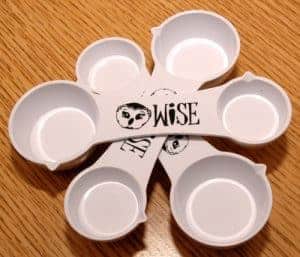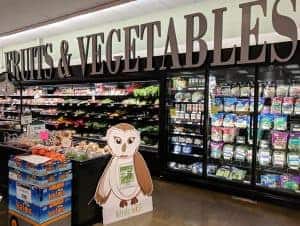WISE Childhood Nutrition Program Wins Education Award
| May 22, 2018 | Rarely are child temper tantrums a sign of success, but this is one of those circumstances.
The WISE program – Together, We Inspire Smart Eating – has been working to introduce fresh fruits and vegetables into the diets of Arkansas children since 2011.
“Parents come into the program thinking, ‘oh, my child won’t eat that,’ but then we hear stories about kids throwing fits in the grocery store aisles, not because they want candy, but because they want green beans. Those are their own kind of success story,” said Leanne Whiteside-Mansell, Ed.D., principal investigator for WISE and a professor in the Department of Family & Preventive Medicine in the College of Medicine.
The WISE program recently welcomed another – more formal – acknowledgement of its success: The Journal of Nutrition Education and Behavior recognized a report about WISE with its 2018 Best GEM (Great Educational Materials) award.
The journal’s committee selected finalists for the recognition, which was voted on by its board of editors. The award recognizes innovativeness/creativity, quality of design, quality of writing and presentation and quality of evaluation. The report was titled “Together We Inspire Smart Eating: A Preschool Curriculum for Obesity Prevention in Low-Income Families,” by Whiteside-Mansell and Taren M. Swindle, Ph.D., an assistant professor in the Department of Family & Preventive Medicine.
WISE is for children age 3-8 to establish healthy early eating habits and encounter a variety of fruits and vegetables – with the ultimate aim of combating childhood and adult obesity. It includes a classroom curriculum, educator training and parent education outreach materials. There are versions of the program for pre-K and kindergarten through first grade.

Food preparation tools like measuring spoons and blenders used in the classroom as part of the WISE program are branded with Windy the owl’s image.
WISE is organized around eight monthly units. Windy Wise, a barn owl puppet, brings letters from farms to the classroom to introduce the featured fruits and vegetables to children: apples, tomatoes, broccoli, sweet peppers, carrots, berries, greens and green beans. Activities throughout the month allow the children to explore the food and use it in recipes.
The program also includes educator training and parent engagement through backpack letters from the farmer and a Facebook and Pinterest page. Windy Wise’s branded logo is printed on utensils used by educators in the classroom and is featured on cardboard cutouts in participating grocery stores.
The program is specifically designed to be effective with high-risk children from resource-poor backgrounds. It is being used in 147 classrooms in Arkansas and 30 classrooms in Louisiana.
Whiteside-Mansell and Swindle have made some interesting discoveries during their time on the project. During their preliminary research before designing the curriculum, they found that 25 percent of Head Start children hadn’t had an apple at home. Among the educators, many lacked food as children, and 33 percent reported still experiencing bouts of food insecurity.
With this context in mind, the WISE program encourages families and educators alike to cultivate healthy food habits such as allowing kids to decide how much to eat, so they only eat when they are hungry and are not urged to “clean their plates” or “make happy plates.” Kids are also encouraged to play with their food and see it transform, which makes them more likely to try unfamiliar foods.
“When we go for classroom visits, that cue to ‘make a happy plate’ still frequently comes up. At first we didn’t understand why, because we cover the negative results of that in the training, but once we surveyed our educators and found their history – and for some, current struggles – with food insecurity, it made more sense. In certain cultures, and the South is one of them, that is a hard habit to break,” Swindle said.
The curriculum is also organized to be budget-sensitive and value the educator’s time. For example, many of the food activities include math or reading or other activities that educators are required to include in their classroom time.
“We’ve tried to make it something that helps educators meet their goals, not something that needs to be tacked on as an additional requirement or afterthought. It can’t compete with other requirements,” Whiteside-Mansell said.
The program also emphasizes the connection between food, people and the land, instead of the abstract notion of food coming from stores or restaurants. The letters from farmers that introduce the foods and communicate with parents feature a variety of types of farming families – from small, backyard-gardens to large-scale family farms and everything in between.
“We’ve documented positive changes in the behavior of children, teachers and parents. We feel that Windy Wise is helping change the culture in the places she visits, and we’re happy to have some of that recognized with the award,” Whiteside-Mansell said.
WISE is a project of the Department of Family and Preventive Medicine Research and Evaluation Division (RED), which Whiteside-Mansell directs.
Funding for WISE comes from grants from the U.S. Department of Agriculture National Institute of Food and Agriculture, UAMS Translational Research Institute, National Institutes of Health National Center for Research Resources and the National Center for Advancing Translational Sciences.


